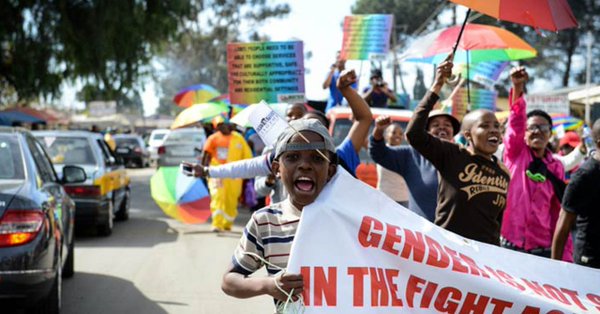
Kathmandu (Pahichan) November 26 – A diagnosis starts with a conversation. But what if you didn’t even have the words to tell a nurse or doctor who you are? Or worse, the only way to describe yourself was a slur. Some people in South Africa don’t have to imagine this. They live it.
In many South African languages, the words to describe people who identify as LGBTQI+ are derogatory and violent, the organisation Find New Words says. It’s something that’s even come out in the work of artist and photographer Zanele Muholi.
“Queer language is so foreign here”, Muholi explains in a 2011 article in the journal Feminist Studies.
Muholi comments: “The West is speaking its own language. Are we using our own language?”
“What is queer in Zulu?”
When it comes to healthcare, LGBTIQ+ already experience discrimination. In Gauteng, 12% of 487 LGBT people who were surveyed in 2003 to find out their experience private and public healthcare facilities said they had delayed seeking treatment for fear of discrimination. And, half as many were refused treatment, according to a UNISA study.
Meanwhile, HIV prevalence rates among men who have sex with men are double those of the general population, according to a 2009 study conducted by Wits University and the Human Sciences Research Council.
The country’s LGBTIQ+ HIV plan hopes to cut new infections among all LGBTIQ+ people by 63% between 2017 and 2022.
Globally, studies have also shown that lesbian, gay and bisexual people are at least twice as likely than their heterosexual counterparts to attempt suicide — in part because of the stigma and discrimination they face, a BMC Psychiatry research review found.
So in 2017 Khanyi Mpumlwana founded Find New Words to help create words to refer to queer people in South African languages. It’s a project that could open up new ways of speaking in communities and between healthcare providers and patients.
She warns: “There are people who would rather risk their lives than return to a clinic because of slurs, jokes and comments healthcare workers make.”
The organisation is crowdsourcing new terms like “|Kha|nam”, which in Khoekhoe means “the love between two people who are the same”. Terms are being workshopped and then will be assessed and refined by language experts and members of the LGBTIQ+ community starting in February 2019.
The organisation crowdsourced over 150 words in more than half of languages spoken in South Africa.
Khanyi says language, coupled with one of the biggest issues facing the community — access to inclusive, safe and affirmative healthcare — is something that needs work.
If healthcare workers can start by using respectful language when helping their LGBTIQ+ patients, it might be a first step in providing quality care that meets the community’s needs, she says.
Mpumlwana hopes that one day, new terms will be included in medical school curricula as part of sensitising students to people’s needs. International research suggests that information on patients’ sexual orientation and gender identity be added to patient records to help healthcare workers provide better care, according to a 2015 articlepublished in the Journal of Medical Systems.
Here’s some of the novel ways to say you Find New Words has created.
Uthingo (isiZulu)
Queer. An umbrella term for people who are not heterosexual or cisgender.
Tshelabong (Setswana)
A person who is transitioning or crossing over.
Gabane (English and isiZulu)
Derived from the word “gay”, combined with the word “stabane” (a slur for a gay man). A man who is romantically or sexually attracted to other men. The resilient and strong-willed one, who looks the insult in its face.
Wa lerato pedi (Sepedi)
Bisexual or “one who loves both”. A person who is romantically or sexually attracted to both men and women.
Qhawekhazi (isiXhosa)
Lesbian. A woman who is romantically or sexually attracted to other women. A woman who has the courage to love another woman and is considered a heroine.
Serurubele (Sesotho)
Transgender. The “transformative, soft, and fluid one”.
Itlasi (isiXhosa)
Intersex or meaning “to have both parts”. This refers to people who are born with any of several variations in sex characteristics. They do not fit the typical definitions for male or female bodies.
Click here to view the full list of words and click here to submit your own.
This article contains a reference to death from suicide. Those in need of support to cope with issues such as depression can call the South African Depression and Anxiety Group (Sadag) on 011 234 4837 8am to 8pm from Monday to Sunday. If you or someone you know may be suicidal, please contact Sadag’s emergency number 0800 567 567. A 24-hour helpline is also available on 0800 12 13 14.
Copyright © All right reserved to pahichan.com Site By: Sobij.